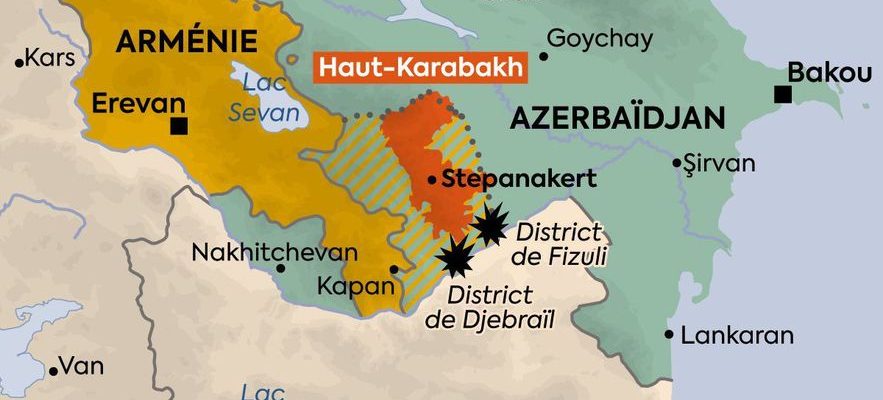“Pachinian, traitor!”, we hear among the hundreds of people gathered on Republic Square in the center of the Armenian capital, this Wednesday, September 20. Disoriented by the lightning offensive carried out the day before by the Azeris in Nagorno-Karabakh, an Armenian enclave of Azerbaijan, many residents of Yerevan are mainly seeking news of their families remaining there. But others target Prime Minister Nikol Pashinian. The annexation of Nagorno-Karabakh took place without the military support of Armenia. “This allows it to emerge from this crisis without compromising itself, because it was the Karabakh authorities themselves who accepted Azerbaijan’s conditions,” explains Richard Giragosian, an expert on Caucasian geopolitics.
But the 120,000 Armenians in the enclave face a serious risk of “ethnic cleansing” by the Azeri authorities, who have not given them any solid guarantees after the annexation. “They are at the mercy of a government in Baku which did not hesitate to kill their own and does not even give them the right to flee!” warns Hovhannès Guévorkian, representative of the Republic of Artsakh (Armenian name of Nagorno-Karabakh) in France. The ten-month blockade of the Lachin corridor, the road linking the enclave to Armenia, which has suffocated the population, has prepared the ground for annexation.
The future of the enclave weakens the Armenian Prime Minister, now convinced that a coup d’état is in preparation. “The opposition does not yet represent a real danger,” explains Knar Khudoyan, a journalist based in Yerevan. “It is above all pro-Russian and does not attract the sympathy of the majority of the population, who believe that Russia is largely responsible for this situation. “
In fact, Azerbaijan’s attack on Nagorno-Karabakh took place without Moscow intervening. The contingent of 2,000 Russian soldiers, responsible for maintaining peace between the two countries after the 2020 ceasefire, was nevertheless supposed to be responsible for the security of the Armenians in the enclave. But the Azeris have increased threats and attacks with complete impunity.
Destabilization of the Armenian political regime
Russian President Vladimir Putin indeed has a very specific strategic objective in mind. “He hopes that the defeat in Karabakh will be destabilizing enough to create real unrest inside Armenia and, ultimately, bring down the Pashinian government, which wants to free itself from dependence on Russia,” analyzes Taline Papazian , teacher at Sciences Po Aix.
In power since 2018, Nikol Pashinian, without going so far as to denounce his alliance with Russia, has also moved closer to the West. But in recent weeks, faced with the growing probability of an attack on Azerbaijan, the Prime Minister has rebelled against his historic partner, criticizing Russia’s ineffectiveness in the Caucasus.
Putin does not hold in his heart this man, who broke with the practices of the former corrupt and pro-Russian Armenian leaders. His nightmare would be that Nikol Pashinian follows in the footsteps of former Georgian President Mikhail Saakashvili, a reformer and pro-Western. The Kremlin would therefore have every interest in working for the coming to power of a new regime close to Moscow in Armenia, as it did in Georgia, now led by a pro-Russian government.
Territorial integrity threatened
Beyond the political upheavals, Armenia is also worried about its territorial integrity. On its borders there is now an Azeri neighbor reinforced militarily, and unpunished for the hundreds of deaths and injuries caused by the massive bombardment of Nagorno-Karabakh. Azerbaijani President Ilham Aliyev has never hidden his territorial claims to Armenia. “The southern corridor of Armenia, Zanguezur, is mentioned in some speeches, while in others he speaks of “West Azerbaijan”, referring to the exclave of Nakhchivan, in Armenian territory” , underlines Taline Papazian.
The conflict in Nagorno-Karabakh which proclaimed its independence in 1991.
© / The Express
“However, Azerbaijan will have much more difficulty taking Armenian territories than Nagorno-Karabakh, because it will be a real conflict between States,” underlines Richard Gigagosian. But if international support is as non-existent as for Nagorno-Karabakh, Armenia has cause for concern.
